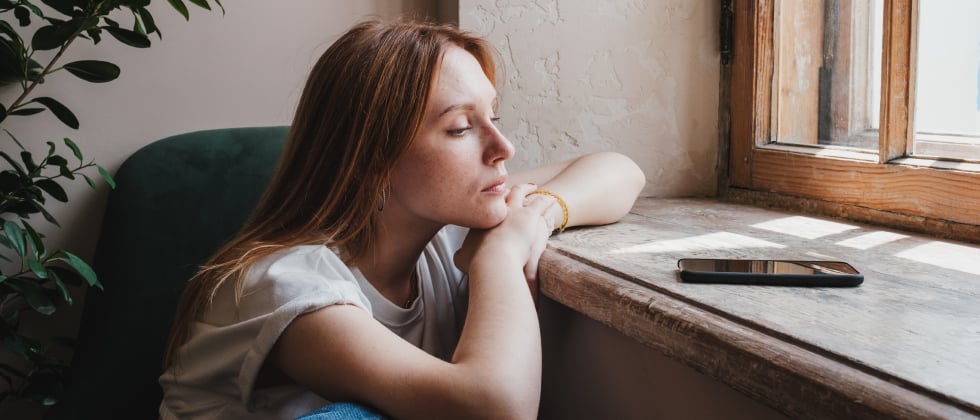
Unrequited love: when it’s happily never after
Cyrano de Bergerac, Pip in Great Expectations, Quasimodo from the Hunchback of Notre Dame… all fictional characters who have felt the torment of unrequited love. As painful as it can be to see – on screen or the page – dealing with unanswered love in real life can be even more of a challenge. In this article, we’ll talk about the meaning of unrequited love, what the signs are, how to deal with unrequited love, and how to move on. We’ll even talk about how to react when you’re the object of affection you don’t reciprocate.
Table of Content
What is unrequited love?
Unrequited love
Put simply, unrequited love is when you have feelings for someone, but they don’t feel the same way. These feelings might be romantic, sexual or simply involve a desire to be close to the object of your affection – either way, they’re not reciprocated.
Most people have had the misfortune of experiencing unrequited love at least once in their lifetime – there’s a reason so many enduring works of literature and film have focused on the pain of not having your feelings reciprocated.
Not all examples of unrequited love look the same – unrequited love might be a crush on someone who doesn’t feel the same way you do, feelings you have for a former partner, being in love with someone who’s already in a relationship, or even feeling like your own partner doesn’t reciprocate the love and affection you feel for them.
Indeed, a study1 has identified five types of unrequited love:
- A crush on someone unavailable
- A crush on someone nearby
- Pursuing a love object
- Longing for a past lover
- An unequal love relationship
No matter how old you are or how many relationships you’ve had in the past, unrequited love is often hard to deal with.

Signs of unrequited love
When it comes to unrequited love, there are two sides to consider: the signs of unrequited love on your part, and the signs your interest isn’t reciprocated.
Signs you’re in love with someone
- You put them on a pedestal
One of the signs of being in unrequited love is the tendency to explain away or erase the person’s flaws and vulnerabilities by putting them on a pedestal. Since you’re denied the opportunity to actually get to know them, you build up a picture in your head that is your image of what they are, rather than the real person. Putting someone on a pedestal can lead to unhealthy relationships, especially when combined with a lack of strong boundaries. - You can’t keep them out of your head
Regardless of what time it is or what you’re doing, they pop up, at least in your imagination. Often, it’s not just thoughts of them, but thoughts about what life would be like as a couple, or fantasies about ways you can win their love, or images of the two of you together. While there’s nothing wrong with a little daydreaming, too much can lead to an unhealthy relationship, especially if you confuse fantasy with reality. - You try very hard to be a part of their lives
You send them texts and messages, make sure to include them in group events or plans, make it a point to speak to them at every opportunity… basically, you want to deepen the relationship and you’re not shy at all about showing it. While some level of assertiveness is a good thing, be sure to read the room and back off if your prospective partner doesn’t seem interested.
Signs they don’t return your feelings
How do you know if someone doesn’t feel the same way you do? Here are three signs your love is unrequited:
- They avoid eye contact and physical touch
One of the surest signs of romantic interest? People getting into your space, leaning in, putting a hand on your arm, making plenty of eye contact and smiling. If the object of your affection does not do these things, odds are your feelings are not reciprocated. A word of caution: don’t mistake friendliness for interest, especially if you’re only seeing the person in a work setting. If you’ve only ever interacted with your crush when they’re at work, the odds are being nice is part of the job. - They’re always busy when you want to make plans
Regardless of whether you ask to hang out at the beach, see the latest blockbuster, want to make plans for this weekend or three months from now – they’ve always got something else going on… and more than that, don’t suggest any alternatives. If you’re the one who’s always pushing to meet up and they’re either deflecting or just saying no, odds are it’s a one-sided love affair. - The conversations are short and not particularly sweet
According to a study2, people who’re interested show it by giving open-ended responses, talking about personal topics and asking detailed, open-ended questions. They’re also more likely to offer compliments, make jokes and extend the conversation. In contrast, people who weren’t interested keep the conversation superficial, give short, close-ended answers, or make excuses. They also end the conversation as soon as possible. Look back at your conversations – they might be telling you they’re not interested without saying the words.
Why does unrequited love hurt so much?
Loving someone without being loved back can undoubtedly have emotional effects, such as:
- General wellbeing: A study showed that experiencing unrequited love negatively influences the self-esteem and life-satisfaction of the people being rejected.3
- Depression: Our brains react to rejection in the same way as to physical pain. Unrequited love can exacerbate any previous feelings we might have of not being good enough, or even loveable. Also, professor and social psychologist Roy Baumeister and his colleague Sara Wotman wrote in their book: “People experiencing unrequited love showed higher levels of depression and tension, and they were significantly more likely to report a recent hangover.”4
- Feelings of isolation: When someone doesn’t love you back it can worsen any feelings of isolation or loneliness you may have, especially if your other relationships, both platonic and familial, aren’t very strong.
- Feelings of inadequacy: Though falling in love is often a matter of chance, feelings of unrequited love –especially if they’re strong – can make someone wonder why they aren’t good enough or what is wrong with them.

How to deal with feelings of unrequited love
So you’ve acknowledged that the person you’re interested in doesn’t return your feelings, next you might be wondering how to overcome unrequited love. While it’s not often easy to move on from feelings of unrequited love, there are things you can do to move on from someone who doesn’t feel the same way as you:
Take the time to grieve
It’s important to acknowledge that your feelings are valid and that you’re not wrong for having them. Not having your affections returned can feel painful and demoralizing – it’s okay to be sad about it. However, it’s important not to let your negative emotions take over your life.
Set firm boundaries
Depending on your relationship with the person you feel unrequited love for, it might be wise to step away from them, whether that means limiting contact, unfollowing or blocking them on social media, or even taking a step back from your shared circles. Setting – and sticking to – boundaries can help you overcome your feelings faster.
Focus on self-care
Unrequited love is honestly rough, especially if the person you have feelings for is in another relationship, or is someone you can’t get out of interacting with. Be gentle with yourself. Remember that while it may not feel like it in the moment, you are loveable as well as worthy of love, even if the stars aren’t aligned right now.
Try to shift perspective with humor
It’s been scientifically proven that humor can be a powerful tool to help ease the pain caused by unrequited love.5 By seeing the situation from a light-hearted perspective, you can take some of the sting out of rejection and reduce the emotional weight it carries. Laughing at the situation not only boosts your mood but also helps you regain confidence and move forward with greater resilience.
Don’t be afraid to seek help
Sometimes, the feelings that come with unrequited love can be too hard to manage on your own. At times like this it’s perfectly okay to lean on friends and family, or if you have access to one, a mental health professional. They can help you deal with your feelings, and help you figure out how to move on in a way that’s both healthy and sustainable.
If you find yourself falling in love with people who don’t return your feelings as a matter of course, it might be worth looking into your attachment style. Attachment theory claims that your relationship with your caregivers in early childhood affects your ability to form relationships as an adult, which has been borne out by research.6 People with the three insecure attachment styles – anxious, avoidant, and disorganized – have a harder time forming attachments than people with a secure attachment style. Fortunately, it’s possible to shift your attachment style with therapy.
How to move on from unrequited love
While unrequited love makes for great literature, it’s not exactly a pleasant state to be in. So how do you get over someone who doesn’t love you? Here are a few tips for how to overcome unrequited love:
Focus on your other relationships
When you’re experiencing unrequited love, it can feel like the other person is the center of your world but that’s not true. When you want to move on from feelings of unrequited love, developing the other relationships in your life is a great way to channel all that energy. Spend time with your family, call up friends you haven’t seen in a while, see if your neighbor still needs a hand with that project. If your family isn’t an option and you don’t have any close friends, this is a great excuse to get out there and make new ones.
Dive into your hobbies
Reading, catching up on your streaming queue, cooking, crafting, watching sports or devoting time and attention to a beloved hobby are some great ways to get your attention off unrequited love, and on to something important to you. Active hobbies like martial arts are great for getting you the good kind of exhausted, and crafting and similar hobbies can leave you with something concrete for all the time and effort you put in.
Give dating another shot
We’re not suggesting you string anyone along or jump into the dating pool before you’re ready, but easing into casual dating whilst being open and honest with yourself and others is one option for someone who’s wondering how to move on from unrequited feelings. Simply allowing yourself to try new possibilities without any pressure to find something serious can potentially help you move on when you’re ready.
If you’re the one who doesn’t feel it
We’ve talked a lot about unrequited love and how to deal with your feelings… but what happens when the shoe is on the other foot? Being the object of someone’s affection can be both flattering and awkward. Here are some tips on how to respond if you’re the person someone is in love with.
Don’t feel guilty
Just because someone is in love with you doesn’t mean you’re obligated to return their feelings. If the idea of giving them a chance is appealing, go ahead, but don’t feel like you somehow owe them anything.
Don’t take advantage
Sometimes, the power you hold over someone because of their feelings for you can go to your head. Even the most well-intentioned person may occasionally fall prey to the temptation to use those feelings to their advantage, so it’s important to recognize that possibility and guard against it.
Be firm about your boundaries
Regrettably, too many of us have been conditioned to think that with enough effort, a ‘no’ can be changed into a ‘yes’. If your paramour is one of those people, don’t hesitate to repeat your ‘no’ as many times as necessary, or even go to the authorities if necessary.
FAQ
Can unrequited love ever become reciprocal?
While it’s possible for someone’s feelings to change, you shouldn’t expect them to, or go in with the idea that if you just push hard enough, they’ll cave. Focus instead on genuinely being a friend with no expectation that the relationship will become anything more; if you can’t do that, it’s best to stay away.
How can I avoid falling into the trap of unrequited love again?
Looking up attachment theory can help you understand why you make the romantic decisions you do. If you have access, therapy is also a great way to figure out why you keep falling into the same patterns. If you don’t, conversations with a perceptive friend are another way to help you understand why you keep falling into the trap… and even more importantly, how to dodge it next time!
Is unrequited love real love?
Just like ‘real’ love, unrequited love is associated with increased brain production of the hormones oxytocin and dopamine. So in that sense, there’s no difference. However, it is important to remember that unrequited love is still one-sided, and be careful not to let your brain and its happy-making chemicals push you to do anything silly.
Unrequited love doesn’t have to be the end of the story
The feeling of unrequited love is not a pleasant experience, and with any luck, you’re reading this article out of curiosity – not for help getting over your own unrequited situation. However, a small silver lining to consider is that unrequited love, while painful and demoralizing in the moment, can be a stepping stone to both personal growth and greater emotional maturity. It’s important to remember, that you shouldn’t settle; you deserve a relationship where there’s equal respect and affection on both sides. This is not to say waiting for that special someone isn’t hard, and you should feel no shame leaning on friends, family, or even a therapist on your way to real love.
Speaking of real love, eharmony is a fantastic way to discover other eligible singles who are looking for the same thing you are – a serious relationship with someone who shares their values. Sign up for eharmony today and get started on your search for real love.
Your search for a great relationship has never been easier with groundbreaking overhaul of the eharmony you know and trust.
We regularly review and update our articles to incorporate the latest research, expert insights, and study findings, ensuring you receive the most relevant information. Learn more about our editorial process.
- Current Version
-
-
Expert review by
Laurel House
-
Expert review by
-
-
Written by
eharmony Editorial Team -
Editorially reviewed by
Copy Editors -
Editorial quality review by
eharmony Editorial Team
-
Written by









